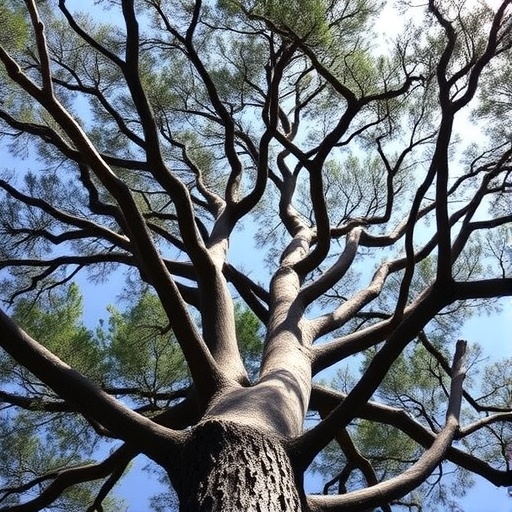A recent study from the University of California, Davis, reveals a disturbing trend in the environmental landscape of California’s elementary schools: a significant decline in tree canopy cover over the last several years. Published in the esteemed journal Urban Forestry and Urban Greening, the research highlights that approximately 85% of the schools surveyed have experienced some degree of tree loss between 2018 and 2022. This finding rails attention not only due to its scale but also because of its implications for the sustainability and health of both the local environment and the schoolchildren exposed to these changing landscapes.
The UC Davis Urban Science Lab, the team behind the research, conducted an extensive investigation into the spatial and temporal dynamics of tree cover on school campuses. While the average loss across the state is relatively modest—less than 2%—some districts, especially in California’s Central Valley, have witnessed dramatic reductions amounting to as much as 25%. This severe degradation is especially problematic in regions already suffering from sparse tree coverage, further exacerbating exposure to the elements for vulnerable student populations.
Tulare County stands out as a particularly hard-hit region, exhibiting the highest concentration of tree loss. In contrast, Imperial County represents an outlier, where researchers recorded notable gains in tree canopy during the same period. Such regional disparities illuminate the complexity of environmental challenges faced by different districts, as well as the efficacy of local interventions aimed at preserving and augmenting urban forestry resources in school environments.
These losses come at a critical time when climate change is intensifying extreme weather phenomena—including intense heat waves and prolonged drought—placing students at greater risk of heat stress and related health complications. The reduction of tree canopy translates directly into less shade and fewer natural cooling effects, leading to elevated surface temperatures on school grounds. Playgrounds, sports fields, and outdoor recreational areas become heat traps, undermining the safety and well-being of children who spend substantial time outdoors during school hours.
Understanding the nuanced role of tree canopy in microclimate regulation is central to the researchers’ work. The Urban Science Lab employs innovative measurement tools such as MaRTyna—a roving cart equipped with sensors designed to capture critical data on mean radiant temperature and other environmental conditions. This mobile platform allows the team to generate hyperlocal temperature profiles across diverse schoolyard settings, providing granular insight into thermal stress conditions that static monitoring stations might miss.
The research underscores the low baseline coverage of tree canopy in California schools, typically ranging between 4% and 6% of total campus area. This sparse distribution leaves millions of K-12 students exposed to direct sunlight for prolonged periods, particularly during breaks and physical education classes, increasing the likelihood of heat-related disorders. Enhancing tree cover is thus not simply a matter of aesthetics but a public health imperative that can mitigate heat exposure and foster healthier environments conducive to improved learning and physical development.
Seasonal and regional measurements conducted during the research revealed stark contrasts in temperature regulation provided by existing tree cover. Coastal schools generally exhibited somewhat moderated thermal environments compared to their inland counterparts, where higher temperatures and aridity compound heat stress. These findings highlight the urgent necessity of targeted greening initiatives tailored to local climate conditions to maximize their efficacy in reducing thermal burdens.
This body of work forms part of a broader collaborative effort involving UC Davis, UC Berkeley, and UCLA, supported by the U.S. Forest Service and Green Schoolyards America. These partnerships aim to leverage interdisciplinary expertise to inform policy and practical interventions for the implementation of equitable tree canopy coverage across the state. The California Schoolyard Tree Canopy study acts as a pivotal resource fostering evidence-based decision-making to prioritize schools that lack sufficient vegetation and thermal relief.
Experts caution that schools represent what could be termed “nature deserts,” environments strikingly deficient in green infrastructure that jeopardize the myriad benefits nature affords early childhood development. Beyond temperature moderation, tree canopies contribute to biodiversity, improve air quality, and support microbiome diversity, all crucial factors in nurturing resilient future generations. The hidden asset of urban forestry within school districts remains vastly underutilized, overshadowed by competing infrastructural demands and budget constraints.
Addressing tree canopy loss requires a multidisciplinary approach that combines scientific research with community engagement and policy reform. This involves mobilizing resources for planting and maintenance programs, enhancing awareness of the importance of natural shading, and embedding green infrastructure into school design. The research convincingly argues that restoring and protecting tree canopy is indispensable in shielding children from escalating climate threats while enriching the educational environment.
Ultimately, this study draws urgent attention to the protective role of urban forestry in climate adaptation strategies within vulnerable communities. By focusing on the most affected school districts and leveraging detailed environmental data, policymakers and stakeholders can craft more effective interventions that balance immediate health concerns with long-term ecological sustainability. The preservation and enhancement of school tree cover emerge as critical components for safeguarding children’s health and fostering climate resilience across California.
Subject of Research: The decline of tree canopy cover in California elementary schools and its impact on outdoor temperature exposure amid climate change.
Article Title: Bleeding green: California’s schools are rapidly losing tree canopy cover
News Publication Date: 18-Oct-2025
Web References:
- Urban Science Lab: https://urbansciencelab.ucdavis.edu/
- California Schoolyard Tree Canopy study (Green Schoolyards America): https://www.greenschoolyards.org/tree-canopy-equity
- Journal article DOI: http://dx.doi.org/10.1016/j.ufug.2025.129117
Image Credits: Credit: Jael Mackendorf / UC Davis
Keywords: Urban forestry, tree canopy loss, climate change, heat stress, school environments, microclimate, environmental health, California schools, urban greening, temperature measurement, climate adaptation, public health




